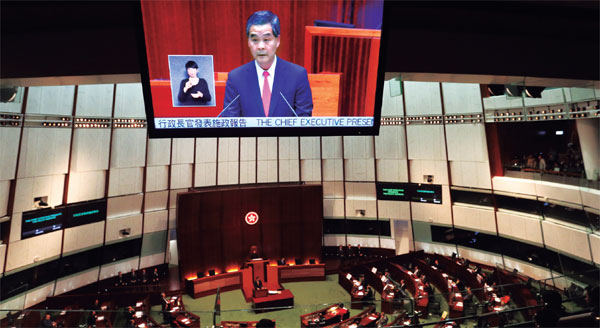New innovation center to boost cross-border ties
Updated: 2016-01-14 07:03
By Frannie Guan in Hong Kong(HK Edition)
|
|||||||||
|
Chief Executive Leung Chun-ying delivers the 2016 Policy Address at the Legislative Council on Wednesday. Edmond Tang / China Daily |
Government sets aside Heung Yuen Wai plot for high-tech reindustrialization
The innovation and technology center to be built near Hong Kong's new boundary control point is set to boost cross-border cooperation in innovation and technology.
Chief Executive Leung Chun-ying announced in his Policy Address that the government has reserved land to boost innovation and reindustrialization near Heung Yuen Wai, the city's newest boundary control point, which is expected to be put in use in 2018.
Eric Yeung Chuen-sing, chairman of the Hong Kong Software Industry Association, believes the new center close to Shenzhen can make it more convenient for Hong Kong entrepreneurs to get connected with mainland factories to manufacture their technological products, especially in areas such as robotics and the Internet of Things.
He also believes the center will witness more exchanges and cooperation among IT professionals and entrepreneurs between Hong Kong and Shenzhen.
According to the Legislative Council Panel on Commerce and Industry, there are more than 330 tenants and 170 incubatees in the Hong Kong Science Park. The occupancy rate exceeds 90 percent in the Phase One and Phase Two buildings, and around 50 percent in Phase Three. And in the three industrial estates in Tai Po, Yuen Long and Tseung Kwan O, which are managed by Hong Kong Science & Technology Park Corporation, the occupancy rate stands at 96 percent.
Different from existing research and development centers like Cyberport and Science Park, where there are no manufacturing areas, the new site will make it possible for researchers to produce their products fast at nearby industrial estates.
"We are not talking about massive production. The industrial estates can be used by high-value-added industries such as biotechnology," said Ken Yung Kin-lam, professor and associate head of the Department of Biology at Hong Kong Baptist University. Yung's Oper Technology, a biotechnology startup in Science Park that focuses on stem cell research, needs more space to expand for production.
But he said currently it was impossible for him to get more space in the Science Park. So he believed the new announcement was exciting news for companies like his that are in urgent need of office expansion.
Allen Ma Kam-sing, chief executive officer of Science Park, said in a statement that he had great interest in developing the technology and innovation center near the border to Shenzhen, knowing that Science Park has the priority in land use. But he explained that more time was needed to fully understand how the government would develop it to achieve a technological cluster effect.
Charles Peter Mok, legislator representing the information technology sector, commented that the Policy Address had set the right direction. But instead of Heung Yuen Wai, Mok said proposed industrial zones in the Northeast New Territories and Hung Shui Kiu near Yuen Long would be more convenient for commuters.
frannie@chinadailyhk.com
(HK Edition 01/14/2016 page2)
